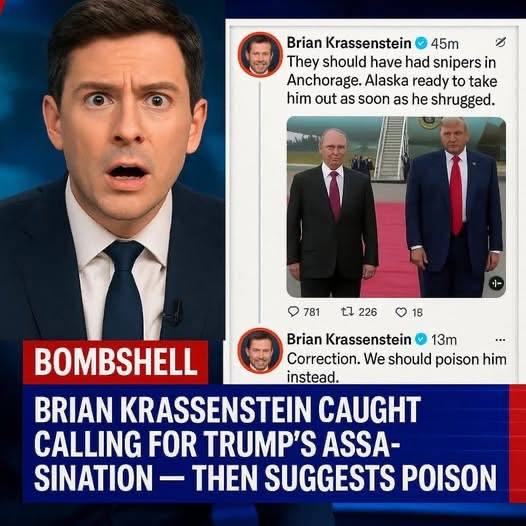Influencer’s Posts on Putin–Trump Meeting Spark Outrage
Date: August 15, 2025 | Location: Anchorage, Alaska
Political commentator Brian Krassenstein is facing intense backlash after posting inflammatory remarks on X (formerly Twitter) about Russian President Vladimir Putin’s meeting with U.S. President Donald Trump in Anchorage.
The Posts That Triggered Backlash
In his initial message, Krassenstein suggested that “snipers should have been positioned in Anchorage… ready to take him out.” Hours later, he issued a follow-up “correction,” claiming poisoning would be “less obvious.”
The comments quickly went viral, with critics accusing him of openly promoting violence. Many also questioned why the posts remained online and why his account had not been suspended.
Reactions Across the Spectrum
-
Conservative response: Breitbart Editor-in-Chief Alex Marlow condemned the remarks as reckless and emblematic of a broader trend of escalating political rhetoric.
-
Free speech debate: Some argued that such rhetoric, even if framed as outrage, risks normalizing dangerous behavior. Others warned that outright removal of posts could spark fresh concerns over censorship and selective enforcement of platform rules.
-
Context: The remarks came shortly after Putin appeared to dismiss questions about civilian deaths in Ukraine during the summit—an exchange that had already heightened tensions.
The Broader Debate
At the heart of the controversy are two enduring questions:
-
How should platforms enforce standards when posts advocate violence, whether jokingly or seriously?
-
What level of responsibility should public figures bear for the weight of their words?
TruthLens Reflection
Moments like this show how unchecked anger can corrode the fabric of public discourse. The Prophet Muhammad ﷺ taught that “the strong one is not the one who overcomes others, but the one who controls himself when angry.” In times of political tension, restraint is not weakness but strength.
Words once spoken—or posted—cannot be taken back. To reject violent rhetoric is not to silence free speech but to insist that accountability and justice be pursued through lawful, ethical means. Only then can public dialogue become a place of remedy rather than harm.


